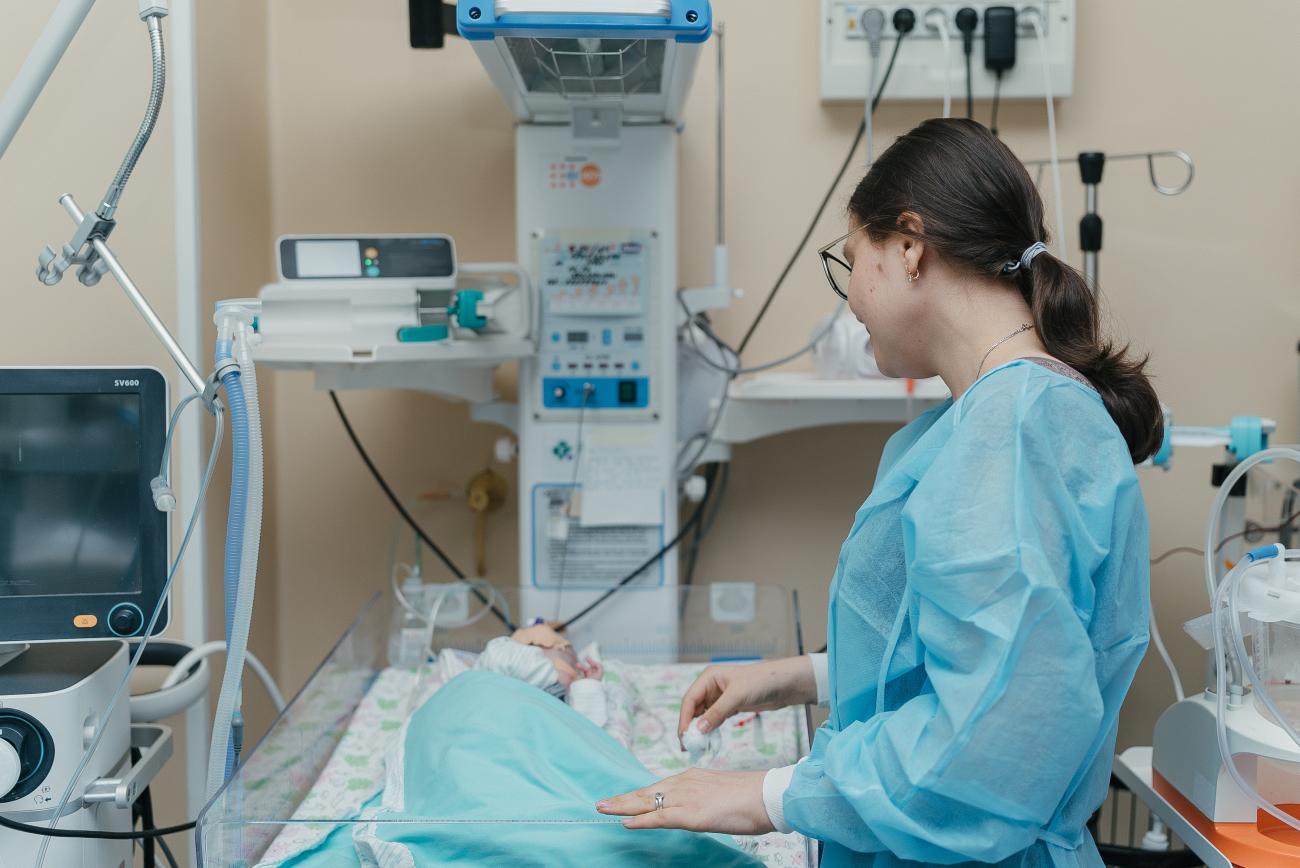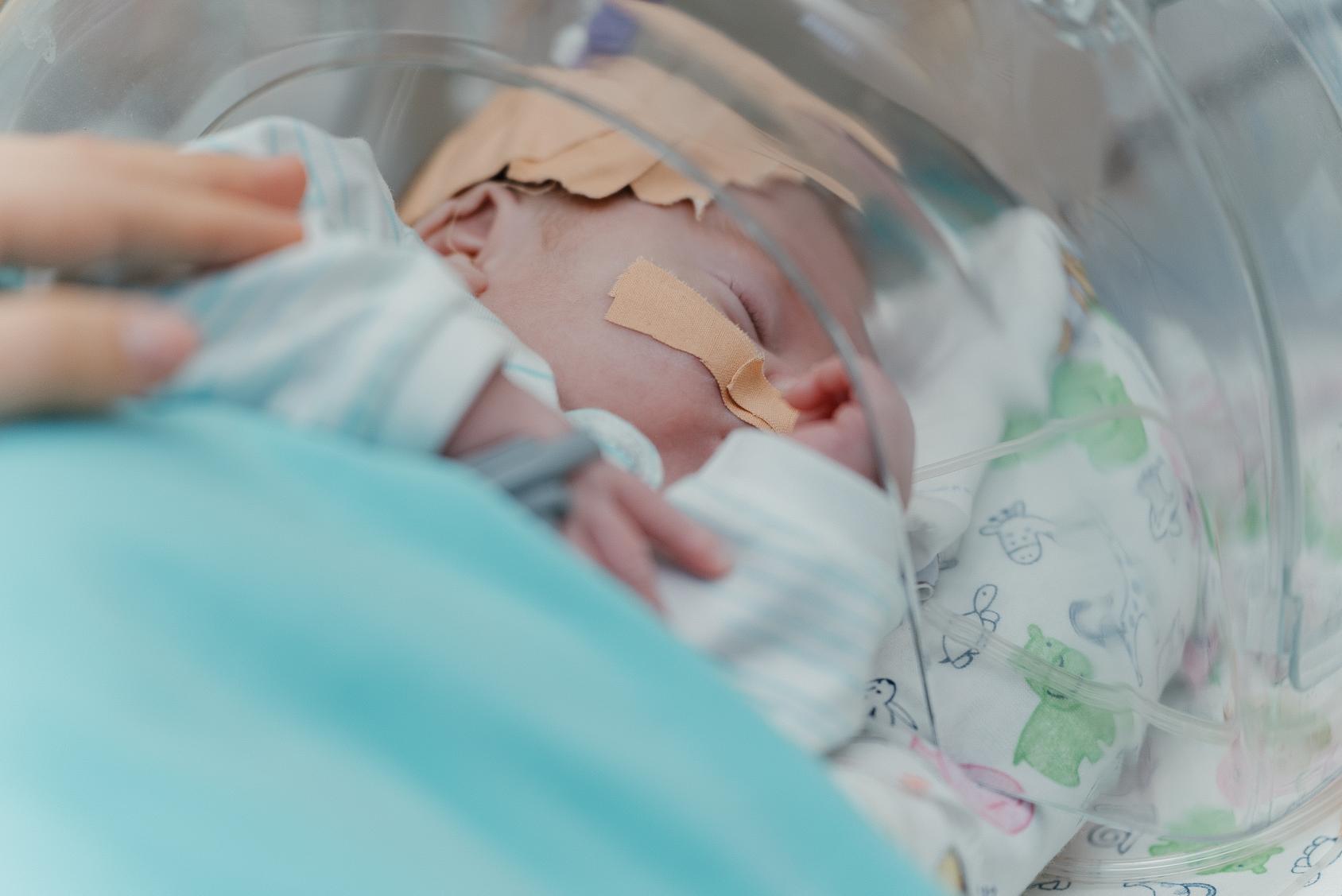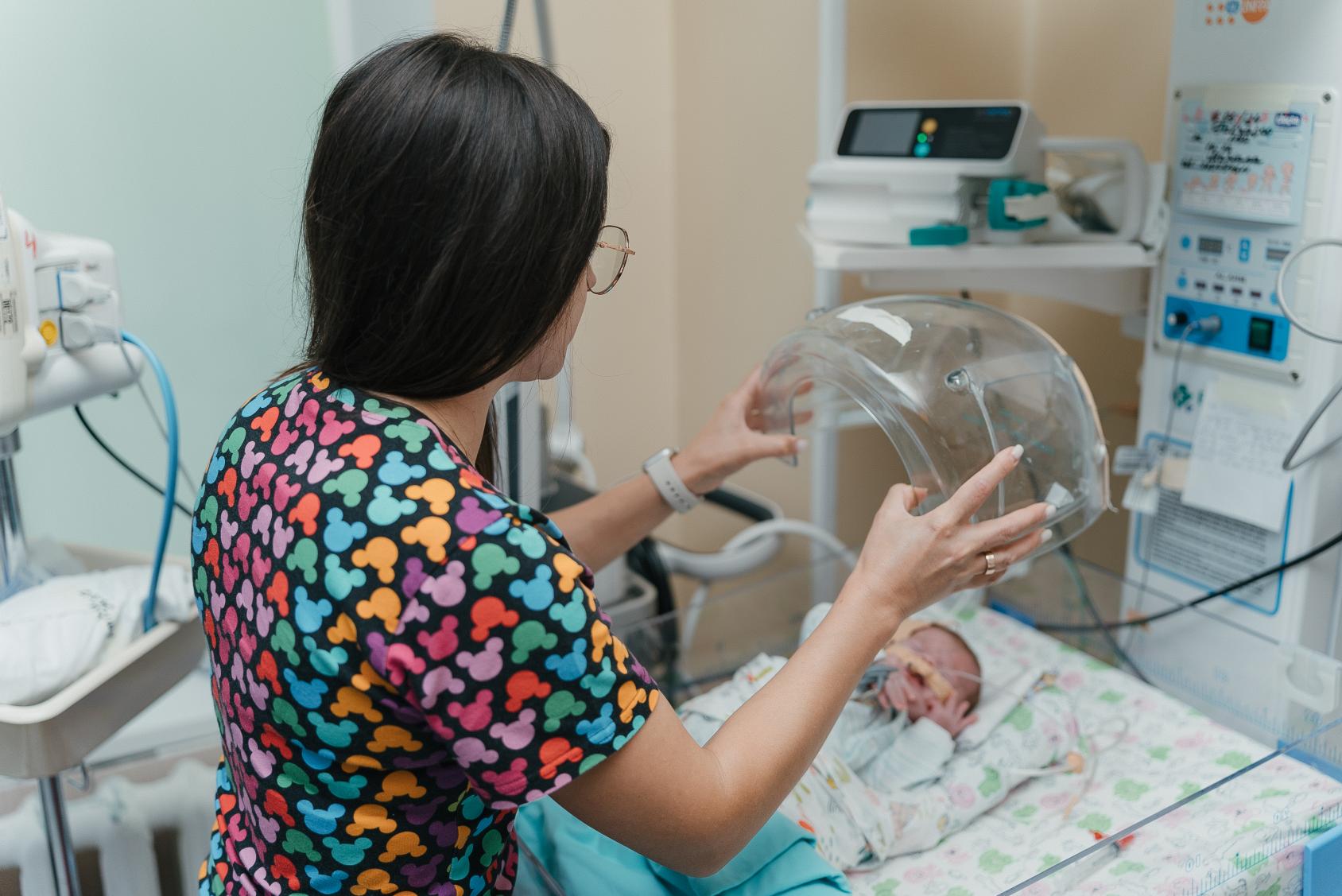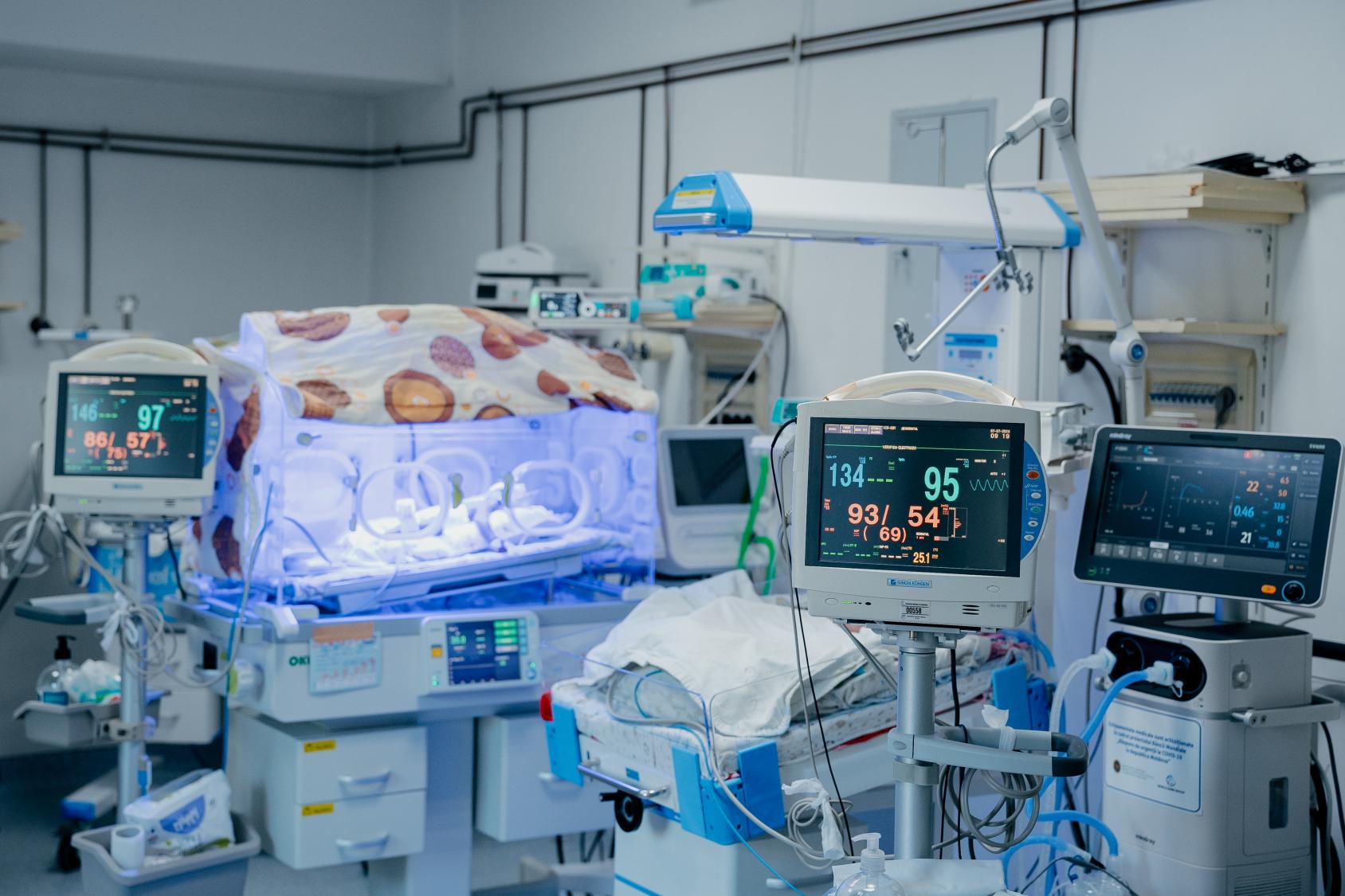Transforming Moldova’s Health System: Hope for the Smallest Warriors

Every day and night, Matei and his mother Mariana are separated by a glass wall in the premature ward of the Mother Child Institute in Chisinau, Moldova. Despite the glass wall of the incubator, baby Matei's temporary crib, they have a bond that needs no words to express a wealth of emotions.
Their journey of reaching the Institute has been a harrowing one.
“I arrived at the Mother and Child Center on May 5, and Matei came into this world on May 6,” shares 26-year-old Mariana. “It has been almost four months since this place has become our home, since we haven't been outside the hospital gate. Matei has been in the neonatal intensive care unit since the day he was born. He weighed 1.2 kg at birth, and now he is almost 3 kg. Unfortunately, he is still here, because besides the small weight, our little boy also has a respiratory disorder.”
The Mother and Child Institute is Moldova’s only national referral healthcare facility for obstetrics, gynaecology, neonatology, and paediatrics. Supported by the UN in Moldova, the centre is dedicated to handling the most complex and serious medical cases affecting women and children. Women from across the country come here for specialized care, often facing high-risk pregnancies complicated by conditions such as diabetes mellitus, cardiovascular diseases, and eclampsia. The Institute also provides critical emergency care for premature babies and newborns with various health conditions.

Addressing maternal mortality
As a medical professional, Mariana opted for this maternity hospital to ensure the safety of both herself and her child. To her surprise, the facility was far more advanced and well-equipped than she had anticipated.
“I have lived with diabetes since I was six. As a doctor, I knew my pregnancy wouldn't be easy. Throughout, I was closely monitored at the Mother and Child Center. At 28 weeks, everything changed when I was diagnosed with pre-eclampsia. My blood pressure soared, and there was a terrifying risk that my baby could suffocate. I had to undergo an emergency C-section. It was overwhelming, but I knew it was the only way to protect my baby,” she said.
Her emergency C-section took place in one of the operating rooms refurbished and outfitted with cutting-edge medical equipment and necessary instruments provided by UN agencies in Moldova, designed for urgent childbirth and high-risk cases.
The COVID-19 pandemic significantly impacted Moldova's healthcare system, restricting access to essential services and contributing to a rise in maternal mortality. Infant mortality in the country also remained alarmingly high—approximately three times higher than the European Union average. In response, the United Nations in Moldova, through its Cooperation Framework and under the leadership of the Resident Coordinator, mobilized UN agencies to strengthen the healthcare system. This comprehensive effort included ensuring universal access to quality care, enhancing the system's resilience to emergencies, and improving in-patient health outcomes. Between 2021 and 2023, these coordinated efforts yielded encouraging results: mortality rates within the Mother and Child Institute decreased from 0.44 per cent to 0.36 per cent, while the rate in the neonatal intensive care unit (ICU) dropped from 9.3 per cent to 7.5 per cent. These positive developments underscore the importance of the UN's ongoing efforts to help address the challenges facing Moldova's healthcare system to improve maternal and child health outcomes.

Advancing neonatal care
Mariana and Matei's journey to a full life outside the hospital, however, was far from over, and the Institute remained a vital source of support for the family.
“At first, I was afraid of touching my baby. When pregnant, you imagine how your baby will sleep in a beautiful crib at home, surrounded by flowers, balloons, and you end up seeing him intubated and surrounded by all kinds of wires and equipment. It was a shock for me. Thanks to the psychologist of the hospital, who supported and encouraged me every day, I started changing Matei’s diapers, cuddling, and feeding him. Of course, I do cry sometimes, but I remember that Matei can sense my feelings,” Mariana explained.
Matei shares his room with six other newborn babies. Behind their transparent walls, symmetrically arranged incubators protect the smallest babies born in Moldova. Temperature, oxygen saturation, heart rate, and many other figures on state-of-the-art monitors in the ward thoroughly monitor the health of the hospital’s smallest patients. Any sign of change in the patients’ vital signs causes neonatologist paediatrician Dr. Natalia Prodan and her team to respond immediately with determined focus.
“Premature newborns are more fragile than babies born at term. For this reason, it is important to monitor carefully any detail linked to thermal instability,” said Dr. Prodan.

Harnessing technology
In addition to the professionalism and empathy of doctors, modern technology plays a crucial role in caring for babies like Matei. Dr. Podan pointed out the difference these investments have made since she joined the hospital: “Six years ago, when I first started working here as a resident, we didn’t have this advanced equipment. It was much harder to do our job. For instance, the monitors didn’t even alert us when their batteries were low. Now, this modern equipment makes our job easier and helps us save lives.”
Support from UN agencies has enabled the refurbishment and equipping of the intensive care and resuscitation units for newborns with state-of-the-art medical equipment and furniture. This joint effort, including contributions from the United Nations Children's Fund (UNICEF), the United Nations Population Fund (UNFPA), and the World Health Organization (WHO), in collaboration with the Ministry of Health, has modernized the facility and strengthened its capacity to provide quality care. In 2023 alone, over 40,500 babies and pregnant women, including Ukrainian refugees, benefited from these enhanced services at the Mother and Child Institute.
“After I feed Matei, I leave him with the nurses, trusting them completely. But the moment I walk away, I start missing him. I find myself looking at his pictures, counting the hours until I can go back to his ward and hold him again. And every time I think about the moment we’ll step outside together, my heart fills with hope,” Mariana said, ready to face a new day.
To learn more about the UN’s work in Moldova visit moldova.un.org













